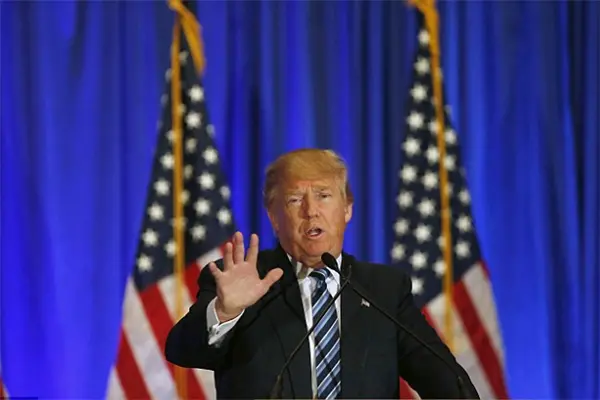Paul Ryan, the highest-ranking U. S. Republican officeholder, on Thursday did not rule out the possibility that he would rescind his endorsement of Republican presidential nominee Donald Trump.
"Of course there are," said House Speaker Ryan during an interview with local radio WTAQ in his home state of Wisconsin when asked whether there were situations that could lead to withdrawal of his endorsement.
"None of these things are ever blank checks. That goes with any situation in any kind of race," said Ryan, before stressing that Trump won the GOP nomination race "fair and square."
During his first public comments since Trump refused to endorse his re-election bid, Ryan, who only reluctantly took the helm of the House of Representatives less than one year ago after his predecessor John Boehner was forced to resign following intraparty rebellion, downplayed the significance of Trump's non-endorsement.
"The only endorsements I want are those of my own employers here in the First Congressional District, and that's really what my focus is," said Ryan.
The feud between Ryan and Trump was again put on full display early this week after Trump declined to endorse Ryan, who faces a longshot challenger in next week's Republican primary election for Ryan's House seat.
"I like Paul, but these are horrible times for our country," said Trump in an interview with The Washington Post on Tuesday. "We need very strong leadership. We need very, very strong leadership. And I'm just not quite there yet."
Trump's snub of Ryan this time matched Ryan's initial response to Trump's winning of the nomination race in May, when the Wisconsin lawmaker said he was "not ready" to fall in line behind the bellicose and bombastic GOP standard-bearer.
A rapprochement prompted by Republican National Committee Chairman Reince Priebus later led to Ryan's endorsement of Trump.
However, Ryan's criticism of his party's titular leader did not end with his endorsement.
His first public breakaway from Trump since offering the endorsement came in June when he faulted Trump for his "textbook racist comments" on a judge because of his ethnic background.
Tensions between the two rose again over the past weekend after Trump derisively answered criticism from Khizr Khan, the father of a Muslim American solider killed by a suicide bomber in Iraq in 2004.
During last week's Democratic National Convention, Khan blasted Trump for his divisive remarks and proposal to temporarily ban Muslims entering the country and implored voters to vote for Hillary Clinton, the Democratic presidential nominee.
Trump responded by implying that Ghazala Khan, who accompanied her husband on stage on the final day of the Democratic National Convention, was forbidden to speak by her husband.
Backlash to Trump's comments came in swiftly from both parties, with Ryan's press office releasing a scathing statement without mentioning Trump's name that denounced "a religious test for entering our country."
"Many Muslim Americans have served valiantly in our military, and made the ultimate sacrifice. Captain Khan was one such brave example. His sacrifice -- and that of Khizr and Ghazala Khan -- should always be honored. Period," said the statement.
U.S. President Barack Obama also weighed in on Tuesday on the controversy, describing Trump as "unfit" to be U.S. president and calling on Republican leaders to rescind support.
"The question they (Republican leadership) have to ask themselves is: if you are repeatedly having to say in very strong terms that what he (Trump) has said is unacceptable, why are you still endorsing him?" said Obama at a press conference. "What does this say about your party that this is your standard-bearer?"
(APD)
 简体中文
简体中文




